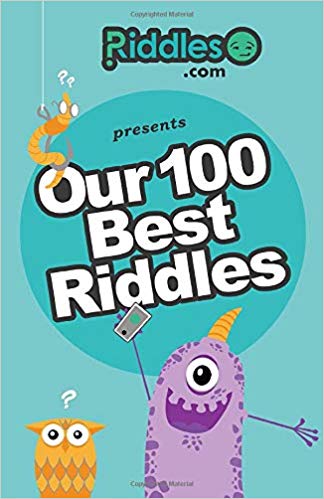
Riddle:
The title of the problem tells you how to approach these four questions.
(A). A bus leaves Moscow for Tula at noon. An hour later a cyclist leaves Tula for mosco, moving slower than the bus. When the bus and cyclist meet, which one of the two will be farther from Moscow?
(B). Which is worth more: a pound of $10 gold peices or half a pound of $20 gold pieces?
(C). At six o'clock the wall clock struck 6 times. Checking with my watch, I noticed the time between the first and last strokes was 30 seconds. How long will the clock take to strike 12 at midnight?
(D). Three swallows fly outward from a point. When will they all be on the same plane in space?
Now check the answers. Did you fall into any of the traps which lurk in these simple problems?
Answer: (A). Neither
(B). A pound of metal is always more than half a pound of the same metal.
(C). Six strokes took 30 seconds, therefore 12 strokes will take 60 seconds. But when the clock struck six, there were only 5 intervals between strokes, and each interval was 30/5=6 seconds. Between the first and twelfth strokes there will be 11 intervals of 6 seconds each, therefore 12 strokes will take 66 seconds.
(D). There is always a plane that contains any 3 points
Riddle:
As I traveled up and down our great glorious country, I found myself in a place where the tempature goes up sharply in the day and down at night. This had an effect on my watch, I noticed it was 1/2 a minute faster at nightfall, but at dawn it had lost 1/3 minute, making it only 1/6 minute fast.
One morning- May 1- my watch showed the right time. By what date was it 5 minutes faster?
Answer: In 24 hours the watch gained 1/2-1/3= 1/6 minute. It would seem it would be 5 minutes fast in 5 X 6= 30 days; that is,the morning of May 31. But already on the morning of May 28 the was 27/6= 4 1/2 minutes fast. At the close of the day the watch gained 1/2 minute more, so it was 5 minutes fast on may 28.
Riddle:
Three pirates, One Eye, Long John, and Peg Leg, were gambling with pieces of gold. All the winnings were piled up on the table. One Eye said, 'I have won 1/2' and took a large handful or two. Long John said, 'I have won 1/3' and took a handful. Peg Leg said, ' I have won 1/6' and took a small handful. One Eye said, ' I have taken too much' and returned a half. Long John said, 'I have taken too much' and returned a third. Peg Leg said, 'I have taken too much and returned a sixth. The money on the table was then shared out equally and they had 42 pieces each. One Eye said, 'I have now 1/2 of the total originally.' Long John said, ' I now have 1/3 of the originally.' Peg Leg said, 'I have now 1/6 of the originally.'
How much was on the table originally?
Answer: 282 Pieces.
Riddle:
I have ten or more daughters. I have less than ten daughters. I have at least one daughter. If only one of these statements is true, how many daughters do I have?
Answer: If I have any daughters, there will always be two statements which are true. Therefore, I have no daughters.
Riddle:
In yon vast field of cultivated space, I there am found with members of my race; Decapitate me - if you've no objection - You then will find what brings me to perfection; Take one more cut, and then you'll plainly see What Iam destined, day by day, to be. What am I?
Answer: WHEAT HEAT EAT
Riddle:
My first is a creature whose breeding is unclear. My second, a price you must pay. My whole can be found in the river of Time and refers to events of today. What am I?
Answer: Current.
Riddle:
Many-manned scud-thumper, Maker of worn wood, Shrub-ruster, Sky-mocker, Rave! Portly pusher, Wind-slave.
What am I?
Answer: The ocean!
Riddle:
An alarm clock runs 4 minutes slow every hour. It was set right 3 1/2 hours ago. Now another clock which is correct shows noon.
In how many minutes, to the nearest minutes, to the nearest minute, will the alarm clock show noon?
Answer: In 3 1/2 hours the alarm clock has become 14 minutes slow. At noon the alarm clock will fall behind approximently an additional minute. Its hands will show noon in 15 minutes.
Riddle:
A student zips on his scooter to ride to the train station to get to college. His home is close to two stops; the first one is a mile from home, and the second is two miles from home in the opposite direction. In the morning, he always gets on at the first stop and in the afternoon, he always gets off at the second one.
Why?
Answer: The sations and his home are on a hill, which allows him to ride down easily on his scooter.
Riddle:
One sunny afternoon, three men go for a ride on a hot air balloon over the Sahara desert. An hour into the trip, the balloon begins to lose altitude. A month later, someone found one of the ballooners laying on the desert sand dead, naked, and holding half a toothpick. What happened to him?
Answer: As the balloon lost altitude, the men took of their clothes and threw them overboard to decrease the weight of the balloon. The balloon continued to drop so the men drew straws to see who would be forced to jump. The dead man in the desert drew the shortest one (the half toothpick).
Riddle:
A watchmaker was telephoned urgently to make a house call to replace the broken hands on a clock. He was sik so he sent his apprentice.
The apprentice was thorough. When he finished inspecting the clock it was dark. Assuming his work was done, he attached the new hands and set the clock by his pocket watch. It was sic o'clock, so he set the big hand at the 12 and the little hand at the 6.
The apprectice returned, but soon the telephone rang. He picked up to his angry client:
"You didn't do the job right. The clock shows the wrong time."
Surprised he hurried back. He found the clock showing not much past eight. He handed is watch to the client and showed her that her clock was not even one second late. The client had to agree.
Early the nect morning, the client telephoned to say the clock has apparently gone berserk, hands were moving around the clock at will. The apprentice again rushed over, the clock showed a little past seven. After checking his watch he yelled:
"You are making fun of me! Your clock shows the right time!"
Have you figured out whats going on?
Answer: As the problem says the apprentice mixed up the hands so that the minute hand was short and the hour hand was long.
The first time the apprentice returned to the client was about 2 hours and 10 minutes after he had set the clock at six.The long had moved olny from twelve to a little past two. The little made two whole circles and an additional 10 minutes. Thus the clock showed the correct time.
The next day around 7:o5 a.m.he came a second time,13 hours and 15 minutes after he had set the clock for six. The long had, acting as the hour hand,covered 13 hours to reach 1. The short hand made 13 full circles and 5 minutes, reaching 7, So the clock showed the correct time again.
Riddle:
What number squared = 12345678987654321?
Answer: 111,111,111
Riddle:
Can you divide the watch face with 2 straight lines so that the sums of the sums of the numbers in each part are equal?
Answer: The sum of the numbers on the watch face is 78. If the two lines cross, there must be 4 equal parts, but 78 is not divisible by 4. Then the lines do not cross, giving three parts with the sum of 26 each. Once you see the pairs on the face that add to 13(12+1,11+2, and so far) the answer will be easy to find.
Riddle:
While playing with a metal washer shaped like a ring, Dave accidentally pushed it on his finger too far and couldn't get it off. Trying to remove it using soap and water didn't work. The hospital sent him to a service station thinking they could cut the metal. Since the ring was made with specially hardened steel, it couldn't be cut. Just then Bob arrived on the scene and suggested an easy way to remove the washer in just a few minutes. What was his solution?
Answer: Bob suggested that Dave hold his finger in the air while someone wound a piece of string tightly around his finger just above the metal ring. The string forced the swelling down. As they unwounded the string from the end nearest the ring, someone else slid the ring up. They continued winding and unwinding the string until the ring could be easily removed.
Riddle:
The hand sows, the eyes harvest?
Answer: To read and to write.
Riddle:
Who spends the day at the window, goes to the table for meals and hides at night?
Answer: A fly.
Riddle:
A man phoned his daughter to ask her to buy a few things he needed for a trip. He told her she would find enough dollar bills for the purchase in an envolope on his desk. She found the note with 98 written on it.
In the store she bought $90 dollars worth of things, but when it was time to pay she not only did have $8 left over but she was short.
By how much and why?
Answer: (A). $4. She had read 86 upside down.
(B). Turn 9 upside down and exchange it with the 8. Both columms will add to 18.
Riddle:
Draw four rectangles on a piece of paper. Put nine x's in the four rectangles so that there is an uneven number of x's in each rectangle.
Answer: Draw one large rectangle. Then draw the three smaller rectangles within the large rectangle. Place three x's in each small rectangle. There will be nine x's in the large rectangle.
Riddle:
You have accidently left out the plug and are attempting to fill the bath with both taps full on. The hot tap takes 6 minutes to fill the bath. The cold tap takes 2 minutes and the water empties through the plug hole in 4 minutes.
In how many minutes will the bath be filled?
Answer: 2 minutes and 24 seconds.
Riddle:
An eye in a blue face saw an eye in a green face. "That eye is like to this eye," Said the first eye, "But in low place not in a high place." What is it?
Answer: The sun on the daisies.

